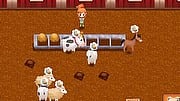
This split and ensuing misstep is worth noting as Seeds of Memories is only Natsume’s second attempt at developing a Harvest Moon game. Many of the features fans had come to know and love in Harvest Moon-from the open world to sensible seasons-were removed or reduced, resulting in a critical disappointment. The Lost Valley, however, was a strange combination of Minecraft-esque terraforming and a greatly diminished world: instead of farming alongside a village packed with townspeople to meet and woo, you were essentially trapped on your plot of land and forced to wait for random passerby to visit you. Story of Seasons was the natural evolution of the last HM game, A New Beginning, and feels like the expected next step in the series. Both companies decided to keep developing farming sims, and the result was basically two Harvest Moon games released for the 3DS in 2015: Harvest Moon: The Lost Valley, by Natsume, and Story of Seasons, by Marvelous.īetween the two of them, Marvelous is the team with experience actually creating a Harvest Moon game. In 2014, the two went their separate ways: Natsume retained the rights to the name “Harvest Moon” while Marvelous kept the developers that actually created the two-dozen games that still bear the HM moniker. For decades, Marvelous and Natsume were partners in bringing near-yearly releases to fans.

The first title, released on the SNES in 1997, was developed by Victor Interactive (later bought by Marvelous) and published in North America by Natsume. Thankfully, the same cannot be said of Seeds of Memories: this is a true Harvest Moon game with all of the farming sim’s familiar trappings, from daily crop-watering to the years-long pursuit of a spouse and two kids.įor a series as prolific as Harvest Moon, it’s difficult to offer a review without at least briefly touching on the game’s history.

2009’s Frantic Farming was a simple puzzle spin-off with little relation to the series’ core roots. Harvest Moon will turn 20 this year, and despite the long-running series’ predilection for portable gaming (16 of the main entries’ 24 titles are on handheld systems), we’ve never had a mobile version until now.


 0 kommentar(er)
0 kommentar(er)
